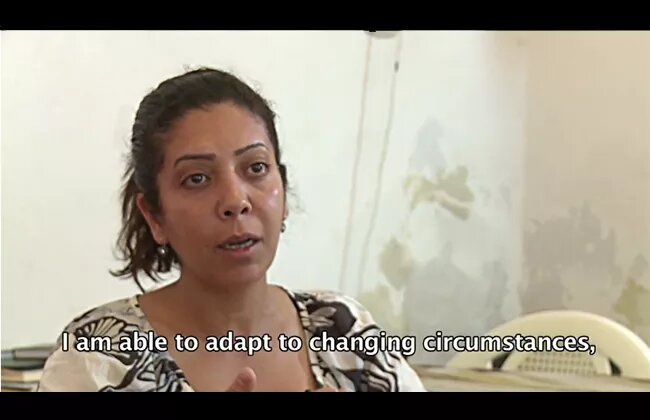
Some Lebanese deal with the issue of the displaced dismissively and unconstructively, with fearmongering tones, spreading ignorance and prejudice. Carole presents us—maybe for the first time—with the opportunity to listen. The film is about the plight of women, and the director is reflected back at us as she plunges into their intimate lives. “To be a woman in a time of armed conflict is more dangerous than being a soldier,” she tells us. Five women refugees from different social and cultural backgrounds share stories that piece together a picture of the present moment and its difficulties. Afra’a, from Halab, is a middle-class woman living in a Beirut apartment with her sister and some friends; a graduate in English literature, she dreams of acting and singing, and spends her time searching for herself during this “time out” in Beirut, encountering numerous obstacles. Umm Omar and Umm Raed live under harsher conditions with their newborns on a piece of land overflowing with waste, next to a reeking warehouse, where there are five families to a single tent. Samar (not her real name, and we never see her face), was forced to marry off her two teenage daughters, though she had once dreamt of sending them off to university. And finally there is Siham, Palestinian, she of the inimitable personality, who buried her husband after watching him die at the Yarmouk refugee camp, then picked up her two twin daughters and fled to Lebanon, still safegaurding his bloodstained clothes and burying them in a flowerpot.
Carole Mansour’s new film tells of these women’s powerful modesty and dignified stubbornness. A smile often finds its way onto a face as it speaks of tragedy. Afra’a sings along with Fairuz and Ziad’s (and Cosma’s) “Autumn Leaves.” Umm Omar laments the fact that she is unable to seduce her husband. Siham soldiers on for the sake of her daughters, Jana and Jodie, and works in the service of refugees. And Samar, nostalgic for the blackbird that used to wake her up every morning, sings along with Asmahan:”O Splendor of Roses, the Beauty of Roses.” Carole takes us right into the intimate heart of the tragedy, introducing us to its real cost, its true victims. Do these people really live side by side with us? One is left, at the end of the film, with a sense of loss, of embarrassment, of failure and anger. One feels obliged to do something, if only to change one’s attitude, to remember always to take these people and their circumstances into consideration in every discussion on the subject. It should be a requirement for every Lebanese to watch, “Not Who We Are”, a film by Carol Mansour in cooperation with Heinrich Boell foundation’s Middle East office in Beirut.
This article is an updated version of Pierre Abi Saab's review of "Not Who We Are", first published on October 14, 2013 in al-Akhbar Newspaper. It was translated from the Arabic by Lina Mounzer and is republished in this version with the consent of the author.